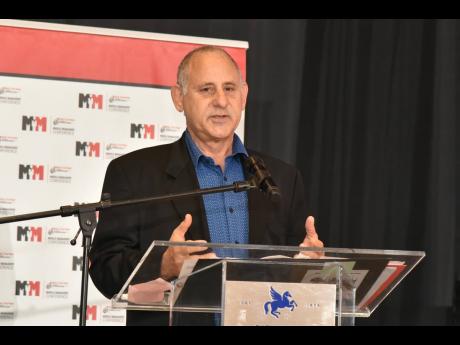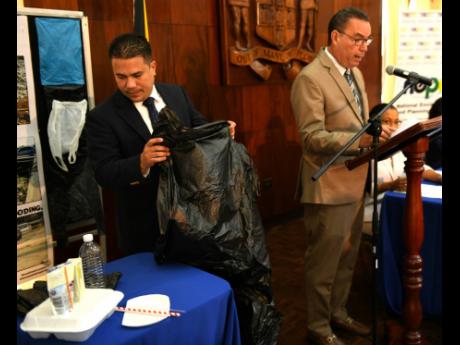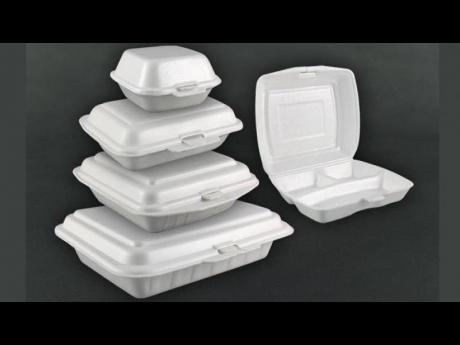Gov’t yet to compensate businesses for banned goods in inventory
JMEA mulled taking court action against State over non-payment
Three years after the implementation of the ban on certain single-use plastic products, local businesses are lamenting that they have yet to receive a dollar of the millions they say they were promised in compensation from the Holness administration.
In fact, the Jamaica Manufacturers and Exporters Association (JMEA) revealed that it has contemplated taking legal action to get the Government to honour its commitment to compensate its members for the banned products they had in stock when the regulations took effect.
In 2018, the Government announced a policy to implement a phased ban on the manufacturing, importation, distribution and use of certain single-use plastic (scandal) bags, plastic drinking straws and expanded polystyrene foam products, in three phases, starting January 1, 2019.
“In January 2021, stakeholders affected by the ban on Styrofoam, plastic bags and plastic straws were advised that JMEA was willing to seek legal recourse on their behalf to obtain the monies based on the commitment articulated by Minister Daryl Vaz from 2019 regarding compensation for plastic bags, straws and Styrofoam which were banned and in the warehouses of the respective companies,” the JMEA told The Sunday Gleaner.
According to JMEA, initially the total compensation cost was just over $53 million; however, an audit conducted by the National Environment and Planning Agency (NEPA) on the banned inventoried items from October to November 2020 resulted in the figure being revised.
The JMEA said it “requested this updated information; however, this was not provided”. The association was advised that the revised figures were sent to the then Ministry of Housing, Urban Renewal, Environment and Climate Change.
The association said since then, there have been several failed attempts to have the State honour its commitment.
The JMEA said it was advised by Vaz (the then minister without portfolio in the Ministry of Economic Growth and Job Creation with responsibility for the Land, Environment, Climate Change and Investment portfolios) and Senator Matthew Samuda to provide the information the Government had requested for banned inventoried items for the compensation mechanism.
Between October and November 2019, seventeen companies sent the data to the finance ministry, per instructions. JMEA members were also advised to quarantine all banned items in inventory.
The JMEA said a follow-up was done with Vaz in January 2020 and the JMEA was advised to write to Finance Minister Nigel Clarke, which it did in February 2020, and followed up in March and June that year.
With no response, the association said it wrote to Prime Minister Andrew Holness in July 2020, but there was also “no response”.
In September 2020, the association wrote to Pearnel Charles Jr, then minister with responsibility for the environment, and had meetings with him in November and December that year.
Pursue legal action
According to the JMEA, frustrated by the whole affair, it contemplated taking the Government to court, but decided against it because only three of the 17 companies were willing to pursue legal action.
“On June 7, 2021, a destruction proposal for goods embargoed under the plastic ban that were stockpiled by stakeholders was received from the Ministry of Housing, Urban Renewal, Environment and Climate Change. This was disseminated to stakeholders. These procedures were developed by NEPA in consultation with the relevant public sector entities. On June 22, 2021, JMEA was advised that a submission would be sent to Cabinet,” the JMEA also noted, adding “we are yet to get an official position from the Government on the compensation mechanism”.
Attempts to get responses from NEPA and Samuda, the minister without portfolio in the Ministry of Economic Growth and Job Creation, were not successful.
More than a week after The Sunday Gleaner sent questions to NEPA seeking to ascertain information on the Government’s commitment to pay businesses for unused products they had in stock, the state agency provided a terse response on Friday.
“The delay in response is regretted. The agency is unable to provide a response to your query at this time,” read an email from Public Relations Officer Shahri Miller. The agency did not state why it was not able to provide a response.
In the meantime, the JMEA said imports of plastic boxes and similar products for the conveyance or packaging of goods increased from US$5.12 million in 2019 to US$12.4 million in 2020.
“Quantities imported grew from 1,063 tons in 2019 to approximately 4,200 tons in 2020. In essence, local Styrofoam production has simply been replaced with foreign plastic alternatives, supporting external economies while the desired environmental impact of the ban has not been achieved,” said the JMEA, whose president is John Mahfood.



